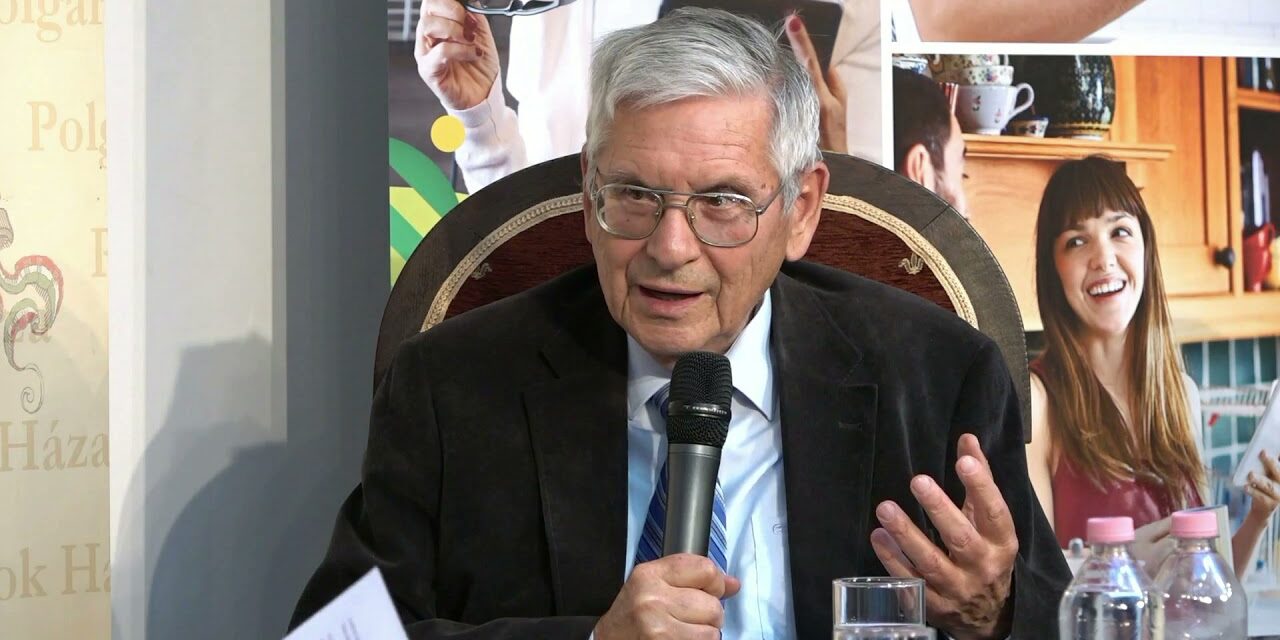Theorists such as Antonio Gramsci and György Lukács came to the conclusion that Christian ideology blinded the working class.
At the conference of the American Conservative Union in Budapest, Viktor Orbán listed 12 points, the observance and following of which are the path to conservative ideas, I would prefer to put it as the enforcement of common sense.
Each point is important, but I would emphasize own media (point 4), building communities (point 11) and building institutions (point 12). In addition to these, as a separate point, I would deal with the criticism of the ideas dominating European mainstream politics, which requires partly philosophical (ideological) and partly scientific work. Studying as an electrical engineer at university, I hated ideological subjects beyond measure, especially the political economy of socialism, which was five hundred pages of confusion, but decades later, already as a journalist, I had to realize that ideological subjects are indeed important, because the political trends that fundamentally influence the lives of people and societies are philosophical determined by fundamentals.
I also learned from the countless debates I took part in at the Planning Office at the time that the final outcome of the debate is decided by the basic assumptions, the starting axioms, because all the rest are just logical deductions. So if we want to disprove something, we want to act against something, then the basic assumptions must be refuted, if possible (when it comes to issues that can be proven), or rejected, when it comes to issues of values. To give an understandable example, during the system change, the mere assumption that "as we know, the state is a bad owner" justified the destruction of Hungarian industry and the research base behind it, which goes back a hundred years.
Or today, the (unproven) assumption that the Earth's temperature depends solely on the carbon dioxide emissions of human activity justifies the completely irrational energy policy of the European Union leadership, which is destroying the European economy, to which the Russian-Ukrainian war - the sanctions policy are also used.
The direct impact of the philosophy can be clearly seen in the rule of law proceedings launched against Hungary, behind which lies a system of ideas whose roots go back a hundred years, notably to 1923, when the Institute for Social Research was founded within the framework of the Goethe University in Frankfurt am Main. William S. Lind, an American "paleoconservative" historian in Who stole our culture? - In his article Who Stole Our Culture, he traces from the beginning how the philosophical trend that started with Marx and György Lukács and was later characterized by the names of Max Horkheimer, Theodor Adorno, Herbert Marcuse and others led to the woke, gender and other similar movements that put pressure on the their stamp on our lives today.
But before we get to the conclusion, it is worth quoting the opening lines of Lind's article, which seems quite strange to our generation, for whom America was the same as the land of freedom, prosperity, unlimited opportunities, and democracy, in stark contrast to the Rákosi and then the early Kádár with his domestic practice. Lind begins: “Sometime in the last half century, someone stole our culture. Just fifty years ago, in the 1950s, America was a great place. It was safe. It was fair. The children received a good education in public schools. Even working-class fathers brought home a middle-class income, so mothers could stay home with the children. Television programs reflected sane, traditional values. Where did it all go?”
The change began when theorists such as Antonio Gramsci and György Lukács concluded after the First World War, when the Western European working class was unwilling to engage in Marxist class struggle, that Christian ideology had blinded the working class to such an extent that the he could not recognize his true, Marxist interests, therefore the main strategic goal is the destruction of Christianity and Western culture - hence the definition of the trend as cultural Marxism. The Frankfurt School developed a powerful tool for "neglecting" Western culture, which it called "critical theory." What was this theory?
The fact that all traditional institutions, starting with the family, were subjected to endless criticism. In his hugely influential book The Authoritarian Personality, published in 1950, Adorno linked traditional views on sexual morality, relationships between men and women, and issues affecting the family with the support of fascism, hence the frequent stigmatization of those who disagreed with them as fascists. Traditional Marxism's teaching of class antagonisms has been transformed into antagonisms between certain groups, in which the oppressors are no longer capitalists but heterosexual white men, and the oppressed are women, blacks, and all kinds of sexual minorities.
Cultural Marxism used Nietzsche's philosophy of revaluing values, according to which existing values should not simply be criticized or destroyed, but turned into their opposites, thereby creating new values and letting the old ones fall into disuse. In this way, all old vices become virtues and all old virtues become vices. Homosexuality is fine and good, but anyone who believes that men and women should have different roles in society is an evil, fascist. In his essay Oppressive Tolerance, Marcuse gives a new meaning to tolerance, according to which the traditional, universal tolerance is oppressive, and true tolerance can only be realized by minorities who are radically intolerant of existing oppression (and traditions). The essay is a masterpiece of how existing values can be turned into their opposite.
In the course of the "long march into the institutions", the cultural Marxist ideas really occupied the institutions, primarily the universities, but also the public offices and judicial institutions in the last half century. Lind is quite pessimistic about how to change the situation, he considers the recapture of the institutions to be hopeless from the outset, and proposes the creation of new institutions instead.
I would not be so pessimistic, but there would definitely be a need for a critique of cultural Marxism that would point out that it is nothing more than the intolerant dictatorship of the minority over the majority, and would offer instead a philosophy that - especially for the younger generation - could restore the a traditional value system serving society as a whole, as represented by religious philosophies for thousands of years.
Confronting intolerant and anti-social cultural Marxism is perhaps the most important, but there are also much more practical policies that affect our everyday economic and social life that we must confront, one of which is the incessant centralization of the EU leadership. The goal they set is a European federal state, but the conditions for which are not given.
This is immediately clear if we compare the EU with, say, the United States or the Federal Republic of Germany: there is no common language, no common historical memory, not enough solidarity, no common foreign policy interest, and most of all no one wants to contribute a quarter of their GDP to the together to use it for common purposes and for the development of less developed countries, as is the case in federations. In the 1970s, when the union was still run by normal people, there were three reports on the terms of the federation, the Werner, Marjolin and MacDougall reports. These could be rubbed under the noses of today's management so that they are at least aware of what they are talking about.
One could also mention the irrational climate and energy policy, with which they want to set an example to the world. But if this policy has failed in Germany, how can it be imagined that the whole world, especially its poorer half, can follow it?
There are many other areas where EU policy contradicts common sense. My opinion is that next to the mentioned 12 points, criticism of the Union's policy should be emphasized, along with those proposals that really serve the interests of Europe.
Author: economist Károly Lóránt
Source: Magyar Hírlap
Photo: 2022plus












